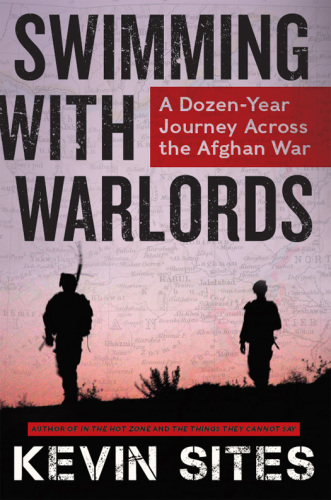
Swimming with Warlords
A Dozen-Year Journey Across the Afghan War
کتاب های مرتبط
- اطلاعات
- نقد و بررسی
- دیدگاه کاربران
نقد و بررسی

September 15, 2014
A prominent journalist embedded with the U.S. troops chasing the Taliban from Afghanistan in 2001 returns to observe the new facts on the ground. Returning to Afghanistan in the summer of 2013 for a fact-finding mission, former NBC News correspondent and current roving reporter and author Sites (The Things They Cannot Say: Stories Soldiers Won't Tell You About What They've Seen, Done or Failed to Do in War, 2013, etc.) offers not only a thorough roundup of the military state of affairs, but also a good sense of how the Afghanis are coping and looking ahead. The author moves geographically through the country, having entered from Tajikistan on the northern border, as he did crossing the Amu Darya River in 2001, to Kabul; then to Jalalabad and Tora Bora; and finally to Wardak and Logar provinces and the perilous combat outposts. As American troops continue to withdraw from the country, training the Afghan National Police to take over, with more or less success, Sites gauges how the police feel about assuming control. The central government of Hamid Karzai has proven ineffective, and the warlords seem to be arming to address the renewed Taliban threat. Sites worries that without a national identity, they will have a hard time beating the Taliban, especially minus the services of the legendary Northern Alliance strongman Ahmad Shah Massoud, who was assassinated in 2001. Destroyed and abandoned military hardware litters the landscape, while the memory of lost journalist comrades like Johanne Sutton is gripping and poignant. During his journey, Sites interviewed military commanders, such as Northern warlord Nabi Gechi, as well as international aid workers and former Taliban warriors, and he visited the Kabul zoo, a heroin den under the Pul-e-Sokhta Bridge, and residential centers for addicted women and children. A somewhat nostalgic, still hopeful look at the residue of American intervention in Afghanistan, from a journalist who knows the terrain.
COPYRIGHT(2014) Kirkus Reviews, ALL RIGHTS RESERVED.

November 15, 2014
Freelance reporter Sites (The Things They Cannot Say) traveled to Afghanistan in 2001, just days after the September 11 attacks. This account describes how the author retraced that journey in 2013, revisiting many of the same locations and people. Reflecting upon his earlier reporting, this work is almost travelog in style. Interviews with warlords, diplomats, military staff, Afghani officials, and even drug addicts reveal that there has been some progress in the country: more educational opportunities, somewhat better prospects for women, improved infrastructure, and better community services (chiefly through NGOs). But after some $600 billion spent and about 2,100 Americans who lost their lives, Sites questions whether this progress was worth the cost. His most recent trip leaves him with no doubt that Afghanistan's ineffective, corrupt government has lost the confidence of its people. As a result, the Taliban is beginning to revive. Nonetheless, the book's interviewees predict that considerable turmoil and disorder would accompany a transition to a new government but are cautiously optimistic that after the U.S. withdrawal, the country will not revert to Taliban control or disarray. VERDICT Ideal for readers interested in political science or those seeking a travelog that reflects the changes in Afghanistan after American involvement.--Mark Jones, Mercantile Lib., Cincinnati
Copyright 2014 Library Journal, LLC Used with permission.

























دیدگاه کاربران